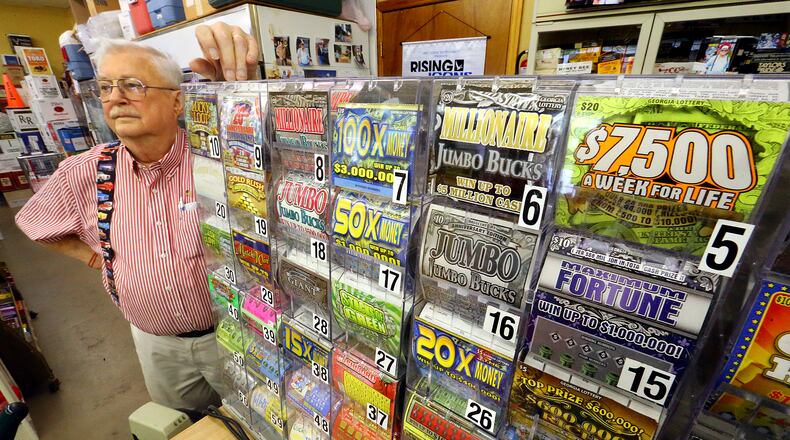State lawmakers have long pressed Georgia Lottery officials to plow more ticket sales money into HOPE scholarships and pre-kindergarten classes, and that appears to be happening.
An analysis of lottery sales figures by The Atlanta Journal-Constitution shows the percentage of net sales going to education programs has increased the past five years, from 25.1% in 2015 to 27.1% in fiscal 2019, which ended June 30.
That may not seem like much, but that 2 percentage point increase meant about $90 million in fiscal 2019.
State Sen. Bill Cowsert, R-Athens, who has sponsored legislation mandating higher lottery payments to education, said it should have happened years ago.
Cowsert’s bill didn’t pass, but Monday he said: “Sometimes you can effect positive change without actually passing a bill. I think the pressure that the Senate put on the lottery board to comply with the law strongly encouraged the board to increase the profit levels.”
Gov. Brian Kemp announced late last week that the lottery provided a record $1.207 billion for the two major school programs, which have given more than 1.8 million students HOPE scholarships and grants and more 1.6 million 4-year-olds pre-kindergarten classes since the game’s inception in 1993.
“We are incredibly proud of this accomplishment and what it means for Georgia,” said Gretchen Corbin, the president and CEO of the Georgia Lottery Corp.
Lawmakers have been closely scrutinizing the corporation’s contribution to HOPE and pre-kindergarten for more than a decade, ever since rising college costs raised concerns that the state wouldn’t be able to cover the tab for the programs.
Legislators have cut benefits in some cases, but the programs have remained extremely popular, and this year the agency that administers HOPE is budgeted to receive $870 million in lottery money.
While lawmakers were taking heat for making changes to HOPE to keep it afloat, they also wondered why the lottery was only putting 25% of ticket sales toward the school programs.
State law requires the lottery to return as close to 35% of ticket sales as possible to the programs that administer the HOPE college scholarships and pre-k classes. The lottery hasn’t gotten close to that figure for many years.
Lottery officials have said the higher the percentage of payment to the state, the lower the percentage paid out to winners. Fewer lottery winners, or less money to those who get lucky, would result in fewer tickets sold, they said. Fewer tickets sold would mean less for HOPE and pre-kindergarten.
Some lawmakers, such as Cowsert, have long been skeptical of that argument. With more and more students in the education programs funded by the lottery, a higher percentage of payments from the lottery would ease some of the pressure to pay for HOPE and pre-kindergarten classes.
Ticket sales have increased from $3.9 billion in 2015 to $4.45 billion in fiscal 2019, according to the corporation.
“The fact that sales have continued to increase while the percentage of profits (to education) has increased disproves the validity of the board’s position that sales would decline if profit levels were increased,” Cowsert said. “I am very glad to see that Gretchen Corbin has responded to my concerns and is successfully moving the needle in the right direction.”
Lottery, HOPE, pre-k
A higher percentage of Georgia Lottery sales have been going to education programs in recent years.
Fiscal 2019
Sales: $4.455 billion
To education: $1.207 billion
Fiscal 2018
Sales: $4.282 billion
To education: $1.143 billion
Fiscal 2017
Sales: $4.218 billion
To education: $1.101 billion
Fiscal 2016
Sales: $4.25 billion
To education: $1.097 billion
Fiscal 2015
Sales: $3.903 billion
To education: $980.5 million
Source: Georgia Lottery Corp.
Stay on top of what’s happening in Georgia government and politics at www.ajc.com/politics.
About the Author
Keep Reading
The Latest
Featured





